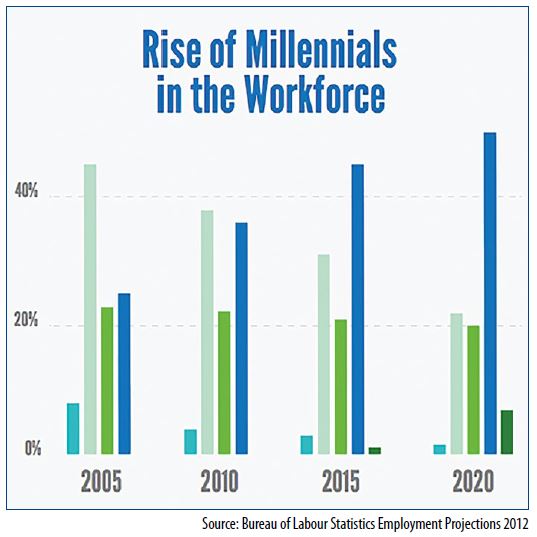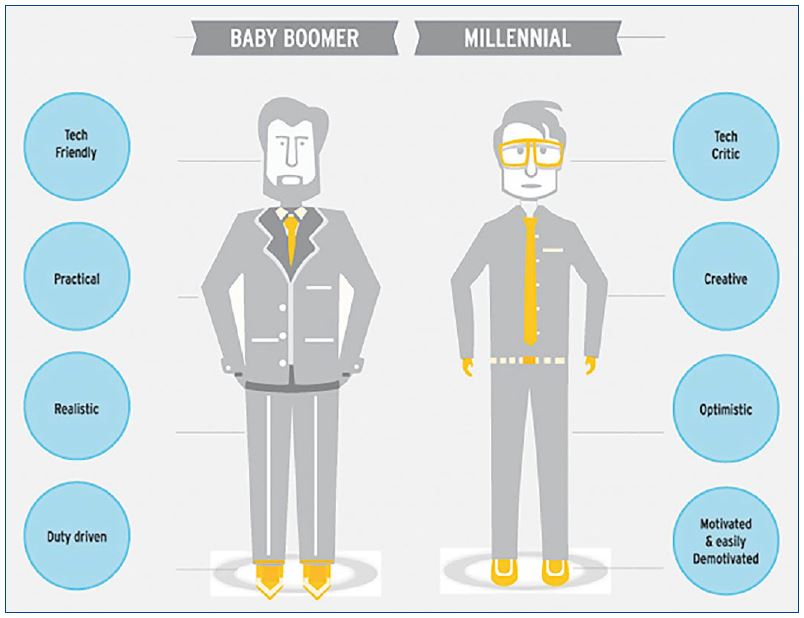
Louis J. Sapi, CPA., CA., MBA
Leadership in the 21st Century
Leadership is an interesting concept, with scholarly experts constantly championing new theories which challenge us towards more malleable styles and structures. Professional service industries have evolved slower than most, with a reticence to alter the traditional hierarchical order of things. But times are changing, and our willingness to adapt and progress must accelerate if we are to succeed.
As professionals, we face many coming changes; some welcomed and others concerning. As leaders, we may choose to allow these headwinds of change to slow and debilitate us or use them to our advantage. The coming tsunami of technological changes monopolises most of our strategic thinking but there is a far more pedestrian change upon us: a change all-enveloping, confusing, rewarding or disastrous. Change that demands a complete rethink on how we need to lead in the 21st century: the rise of the millennials.
A breed all their own, these adults, born in the 1980s and 1990s, are quite different in how they think, work, use technology, and socialise and…they will represent 75% of our workforce by 2025. In some firms, it has already happened. We will lose our ability to successfully lead our firms into the future if we do not understand how they think, work and feel.
We need to adapt our tone at the top to build the new style of CPA firm that the future demands.
This new leadership theory, “tone at the top”, is gaining in popularity. It will determine the type of people you hire; the type of leadership they require. Millennials gravitate towards a specific style of leadership in order to extract the best of their talents.
Millennials crave a tone at the top, whereby leaders respect and recognise their individual competencies by practicing and displaying autonomy, but also provide coaching as required. Management must create an environment for millennials with ambitious goals which have specific objectives, e.g. achieving weekly targets that feed into monthly targets which feed into quarterly targets. Next, tone at the top must simplify and eliminate complexity to ensure millennials remain engaged. Millennials gravitate towards leaders who advocate for them and are masters of diplomacy. For instance, empowerment is not just a buzz word; rather, it’s synonymous with the freedom to act and make decisions. Management must now have both the ability and willingness to play quarterback to facilitate decision making and autonomy.
In terms of the personality characteristics that management must embody, humbleness is at top. Millennials are attracted to selfless leaders who inspire everyone around them to achieve and surpass individual and corporate objectives.
For example, a study from Deloitte revealed more than two-thirds of millennials think it is management’s job to provide them with accelerated development opportunities in order for them to stay with their current employer. With their seemingly restless job-hopping mentality and need for constant recognition and reward, we need to refine our leadership of them to keep them with the firm.
We need to rethink the type of person we hire. Do we want “robots” or entrepreneurs who can help lead from below while rising up the ladder? We need to adapt the way we mentor them. According to a University of North Carolina study, 88% of millennials crave feedback in real time as well as frequent in-person check-ins on progress. They expect us to provide them a clear personal advancement plan and timeline outlining what we are going to do to make it happen and happen faster than we are accustomed to.
Their learning and training styles dramatically differ from those of us that came before and lead today. Millennials expect their employer to enable learning anytime and anywhere and make it easy to learn and grow on the go with cloud-based or mobile e-learning app solutions. This caters to millennials’ penchant for multi-tasking. Our new training and mentoring must make segments short and visually appealing. Millennials are social everywhere they go and are too busy multi-tasking to spend more than a few minutes on one topic.
A firm must also not be perceived as anti-social. We must include elements for social sharing or engaging with our platform via Twitter, LinkedIn, Facebook, Instagram and other social networks
Unequivocally, this paper represents just the tip of the iceberg for new-age firms, which requires a new tone at the top, with new-age leaders. This new leadership style will need to truly display a holistic and complete approach to managing a firm. The ability to debate, motivate and coach millennials to attain a harmonious marriage throughout the organisation is paramount for the future success of firms.


XLNC MAGAZINE | No. 03 | May 2019

